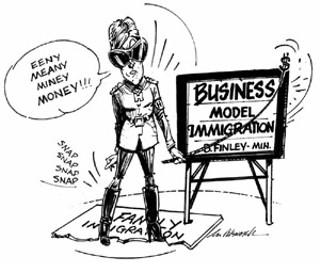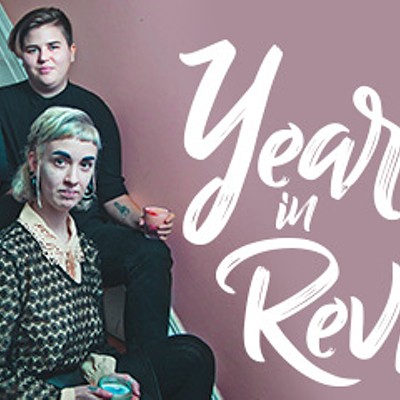The philosopher Immanuel Kant argued we should never treat people as simply a means to some end. But that's exactly what Canada's immigration system does when it evaluates prospective immigrants based on their skills, education or money. We assume that the most desirable immigrants are those who can fill high-end jobs and contribute to a booming economy. This approach is sometimes called "the business case model" and immigrants themselves are often referred to as "human capital." Those buzzwords came in for sharp criticism this month at a national immigration conference in Halifax organized by the Metropolis Project, a network of academic researchers, government officials and community groups. The Metropolis Project uses the image of a bridge as part of its logo, but Hieu Van Ngo drew laughter from the 900 delegates when he said that a more fitting symbol would show immigrants as cows to be milked. Ngo is director of a group in Calgary that pushes for better language instruction to help young immigrants succeed in school. He knows the problems immigrants face firsthand, having left Vietnam at 15. He spent several years in a Thai refugee camp before arriving in Canada. "We should put families and youth at the centre of our immigration policy rather than economic needs," he told the delegates.
It was a thought echoed at the three-day conference by many others including Godfrey Baldacchino, a recent immigrant from Malta who now teaches at UPEI. "I don't like to see myself as human capital on two legs," Baldacchino said as the delegates laughed. Tom Denton, who works with an organization in Manitoba that co-ordinates the private sponsorship of refugees, said he'd like to see more emphasis on a nation-building approach. "We have forgotten the vision that was enunciated by Sir Wilfrid Laurier a hundred years ago when he thought Canada would grow to a hundred million people by the end of the century," Denton said. He added that our narrow-minded immigration thinking has made Canada "a rather small player among nations when it could have been a great player." Denton worries that the latest Tory plan to give the federal minister of immigration more power to determine who gets into Canada will mean a continuing emphasis on skills at the expense of family reunification. "I would like to see more of an emphasis on families because it's the thing that really has driven immigration into this country," he said. "I know there is a category for family immigration, but it's a very narrow, restrictive category that doesn't really do the job." For example, the restrictions make it hard for immigrant families to get grandparents into Canada. Yet Doug Durst, professor of social work at the University of Regina, said that grandparents often help raise immigrant children and perform unpaid work in family businesses.While delegates were critical of immigration policies which keep family members apart, many were even more concerned about the plight of temporary foreign workers. Every year Canada admits about 100,000 of them. They work on farms or as live-in nannies and caregivers, and also in a wide variety of often low-skilled and poorly paying jobs. In most cases, they must leave Canada when their permits expire. Permits last anywhere from eight months to just over three years. Stan Raper of the United Food and Commercial Workers said his union has been working on behalf of temporary agricultural workers who often face problems such as substandard housing, language barriers that prevent them from getting medical or legal help, and no way of defending themselves against employers who can send them home at a moment's notice if they voice concerns about their treatment or working conditions. Eugenie Depatie-Pelletier, a researcher at the University of Montreal, said she sees temporary foreign work as a modern form of slavery, the worst part of an immigration system that increasingly treats people as units of production, not human beings.Cows or People
Editorial by Bruce Wark
[
{
"name": "Air - Inline Content - Upper",
"component": "26908817",
"insertPoint": "1/4",
"requiredCountToDisplay": "8"
},{
"name": "Air - Inline Content - Middle",
"component": "26908818",
"insertPoint": "1/2",
"requiredCountToDisplay": "8"
},{
"name": "Air - Inline Content - Lower",
"component": "26908819",
"insertPoint": "100",
"requiredCountToDisplay": "1"
}
]
















